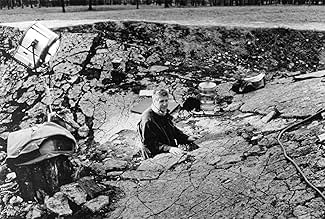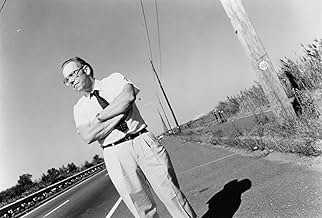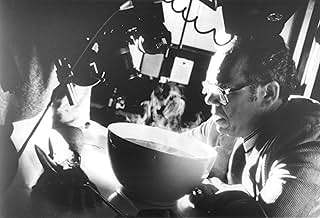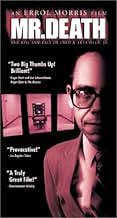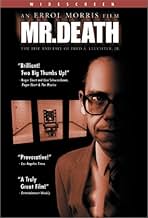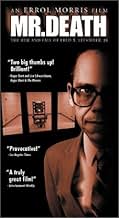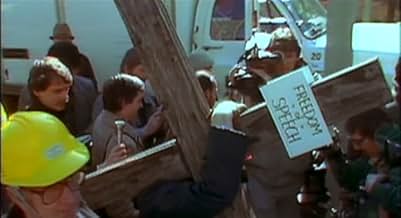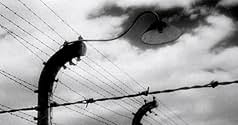AVALIAÇÃO DA IMDb
7,5/10
5,9 mil
SUA AVALIAÇÃO
Adicionar um enredo no seu idiomaA cinematic portrait of the life and career of the infamous American execution device designer and holocaust denier.A cinematic portrait of the life and career of the infamous American execution device designer and holocaust denier.A cinematic portrait of the life and career of the infamous American execution device designer and holocaust denier.
- Prêmios
- 1 vitória e 8 indicações no total
Fred A. Leuchter Jr.
- Self
- (as Fred Leuchter)
Caroline Leuchter
- Self
- (narração)
Adolf Hitler
- Self - Leaves Plane
- (cenas de arquivo)
- (não creditado)
Errol Morris
- Self - Interviewer
- (narração)
- (não creditado)
Avaliações em destaque
Errol Morris has certainly 'injected' (pardon my contextural
pun) a bit of energy into the documentary form, even if the
films he makes lie somewhere outside its confines. Mr Death,
with its characteristic visual flourishes and tangents, is no
exception to this, though it does contain excerpts of a 'true'
documentary of Leuchter pilfering 'evidence' from Auschwitz.
Morris' film refutes Leuchter's findings to the point that the
only viewer who would give tham any credence would have to be as
biased as Ernst Zündel, the revisionist publisher whom
Leuchter's testimony defended. One detail of the film sticks out
in my mind... the home movies of young Leuchter accompanying his
father to work at the local prison, where he pals around with
the convicts, and explains how he learned at this tender age to
pick locks, pockets and safes... and with audible smugness
relates that these skills have actually aided him later in life.
The image of this boy nebbish, undoubtedly an outcast and loner
at school and socially, gaining acceptance amongst the convicts
helps to explain why such an intelligent and resourceful person
could be duped by the likes of the pinheaded, hateful Neo-Nazi
Revisionists. Here's a group of 'bad guys' accepting, applauding, listening and agreeing to Leuchter. Of course this
is because his undeniably faulted research supports their own
misguided conclusions. But it mirrors his experiences as a boy
among the convicts and provides a strong psychological
foundation for Leuchter's downfall into his delusional world. I'd recommend this film to anyone who enjoys thought-provoking
cinema, realizing that they are sadly in a minority amongst
filmgoers.
pun) a bit of energy into the documentary form, even if the
films he makes lie somewhere outside its confines. Mr Death,
with its characteristic visual flourishes and tangents, is no
exception to this, though it does contain excerpts of a 'true'
documentary of Leuchter pilfering 'evidence' from Auschwitz.
Morris' film refutes Leuchter's findings to the point that the
only viewer who would give tham any credence would have to be as
biased as Ernst Zündel, the revisionist publisher whom
Leuchter's testimony defended. One detail of the film sticks out
in my mind... the home movies of young Leuchter accompanying his
father to work at the local prison, where he pals around with
the convicts, and explains how he learned at this tender age to
pick locks, pockets and safes... and with audible smugness
relates that these skills have actually aided him later in life.
The image of this boy nebbish, undoubtedly an outcast and loner
at school and socially, gaining acceptance amongst the convicts
helps to explain why such an intelligent and resourceful person
could be duped by the likes of the pinheaded, hateful Neo-Nazi
Revisionists. Here's a group of 'bad guys' accepting, applauding, listening and agreeing to Leuchter. Of course this
is because his undeniably faulted research supports their own
misguided conclusions. But it mirrors his experiences as a boy
among the convicts and provides a strong psychological
foundation for Leuchter's downfall into his delusional world. I'd recommend this film to anyone who enjoys thought-provoking
cinema, realizing that they are sadly in a minority amongst
filmgoers.
Leuchter is an expert in execution technology (designer of electric chairs, gas chambers, etc.), whose career was wiped out when he got swept up in the Holocaust revisionism movement (he testified, as an expert witness in a defamation suit, that the Auschwitz crematoria could not and did not serve as gas chambers). In this vivid documentary, Morris lets Leuchter speak for himself (which reveals him to be a man of limited horizons with a - let's say - quirky moral code, likely undone by hubris rather than evil [although Morris may deliberately be making that as far as possible an eye-of-the-beholder issue]), while providing a blizzard of visual accompaniments that emphasize the lurid raw material of Leuchter's life (a strategy indicated by the B-movie undertone of the title), and flirt with his obvious sense of his own heroism. Leuchter has more than enough rope here to hang himself, and pretty much gets the job done. Morris doesn't try to explore the issue of Holocaust revisionism generally, pretty much taking our revulsion on faith: if anything, from my limited previous reading on the subject, that's doing Leuchter a favor. Anyway, revulsion or not, it's hard not to be fascinated by a man who can calmly chatter about his value-pricing approach to selling death machines (although custom made, he tells us, they're sold at "off the shelf" prices).
I have never seen a movie handle moral ambiguity quite like this before. It's ambiguous on so many levels. FL Jr. worries about the humanity of the methods of execution, and it never occurs to him that the act itself is inhumane. The obvious hatred in the face of Shelly Shapiro (leader of a Holocaust remembrance group) makes you wince at the moral ambiguity of her acts. And finally that this mouse of a man is neither Jesus nor Hitler (two comparisons made in the film) is the only firm footing you are left with. Not earth-shattering, but what a film!
Leuchter is one amazing guy. This is a guy who became one of the US's foremost experts on death engineering - he designed and built/rebuilt several execution devices for death rows throughout the nation. Then, tragically, he took it upon himself to travel to Auschwitz and hammer bits off the gas chambers to bring home for cyanide testing. His conclusion: no-one was gassed there. Oops. Then he compounded his mistake by testifying for Ernst Zundel and speaking at holocaust-revisionist meets throughout the world.
So, an excellent subject for a movie, and Morris does an okay job. There are a few faults. The quality of some of the interview footage is quite poor. And there is the question of the reconstructions. Leuchter provided Morris with plenty of "home movies" which are incorporated into the film, so the function of the reconstructions seems merely to be to reinforce in our minds the dramatic qualities of a lot of the actions Leuchter performed. Personally, I could've done without them.
10/10 for the subject, 6/10 for the film-making, gives 8/10 overall.
So, an excellent subject for a movie, and Morris does an okay job. There are a few faults. The quality of some of the interview footage is quite poor. And there is the question of the reconstructions. Leuchter provided Morris with plenty of "home movies" which are incorporated into the film, so the function of the reconstructions seems merely to be to reinforce in our minds the dramatic qualities of a lot of the actions Leuchter performed. Personally, I could've done without them.
10/10 for the subject, 6/10 for the film-making, gives 8/10 overall.
This is the story about how the world's foremost authority on gas chambers and all methods of executions proved that the Nazi "gas chambers" could have never operated the way historians claim. It completely destroyed his life, proving that Jews control the world. I assume Errol Morris wasn't intending on letting his feelings be known but it seems like he tries hard to make Leuchter look like a bad man and he consistently fails. It's really strange that he would make dramatic recreations of stuff that happened. That has no place in a documentary. The most interesting thing about the movie is that everyone who tries to discredit or insult Leuchter has absolutely no facts or real argument. They can only say things like he "desecrated a holy land" or "wasn't qualified". After the Jewish man who did the tests on the concrete samples and then testified that his results and report were 100% accurate and true, found out what the trial was about, he quickly says that he performed the wrong tests. The only argument anyone can muster is "you have to be crazy to say this". They claim Leuchter just wanted the spotlight but it's very clear that's not true. He was dragged into a court case and provided expert testimony, without bias. The only accurate statement his detractors made is that he came from nowhere and returned to nowhere. It's not only true, it's all he wanted and it doesn't even matter. This movie proves he is right.
Você sabia?
- CuriosidadesAccording to A Brief History of Errol Morris (2000), Morris made a rough cut that he showed to colleagues and friends that only had Leuchter interviewed and it was Morris' intention that the audience would understand he was saying things either as lies or flat-out wrong. He was advised to go to Auschwitz and dig deeper so that there would be no doubt for the audience that Leuchter was wrong.
- Citações
Fred A. Leuchter Jr.: The human body is not easy to destroy and it's not easy to take a life humanely and painlessly without doing a great deal of damage to the individual's body.
Principais escolhas
Faça login para avaliar e ver a lista de recomendações personalizadas
- How long is Mr. Death: The Rise and Fall of Fred A. Leuchter, Jr.?Fornecido pela Alexa
Detalhes
- Data de lançamento
- Países de origem
- Idioma
- Também conhecido como
- Mr. Death: The Rise and Fall of Fred A. Leuchter, Jr.
- Locações de filme
- Empresas de produção
- Consulte mais créditos da empresa na IMDbPro
Bilheteria
- Faturamento bruto nos EUA e Canadá
- US$ 507.941
- Fim de semana de estreia nos EUA e Canadá
- US$ 24.125
- 2 de jan. de 2000
- Faturamento bruto mundial
- US$ 507.941
- Tempo de duração1 hora 31 minutos
- Cor
- Mixagem de som
- Proporção
- 1.85 : 1
Contribua para esta página
Sugerir uma alteração ou adicionar conteúdo ausente

